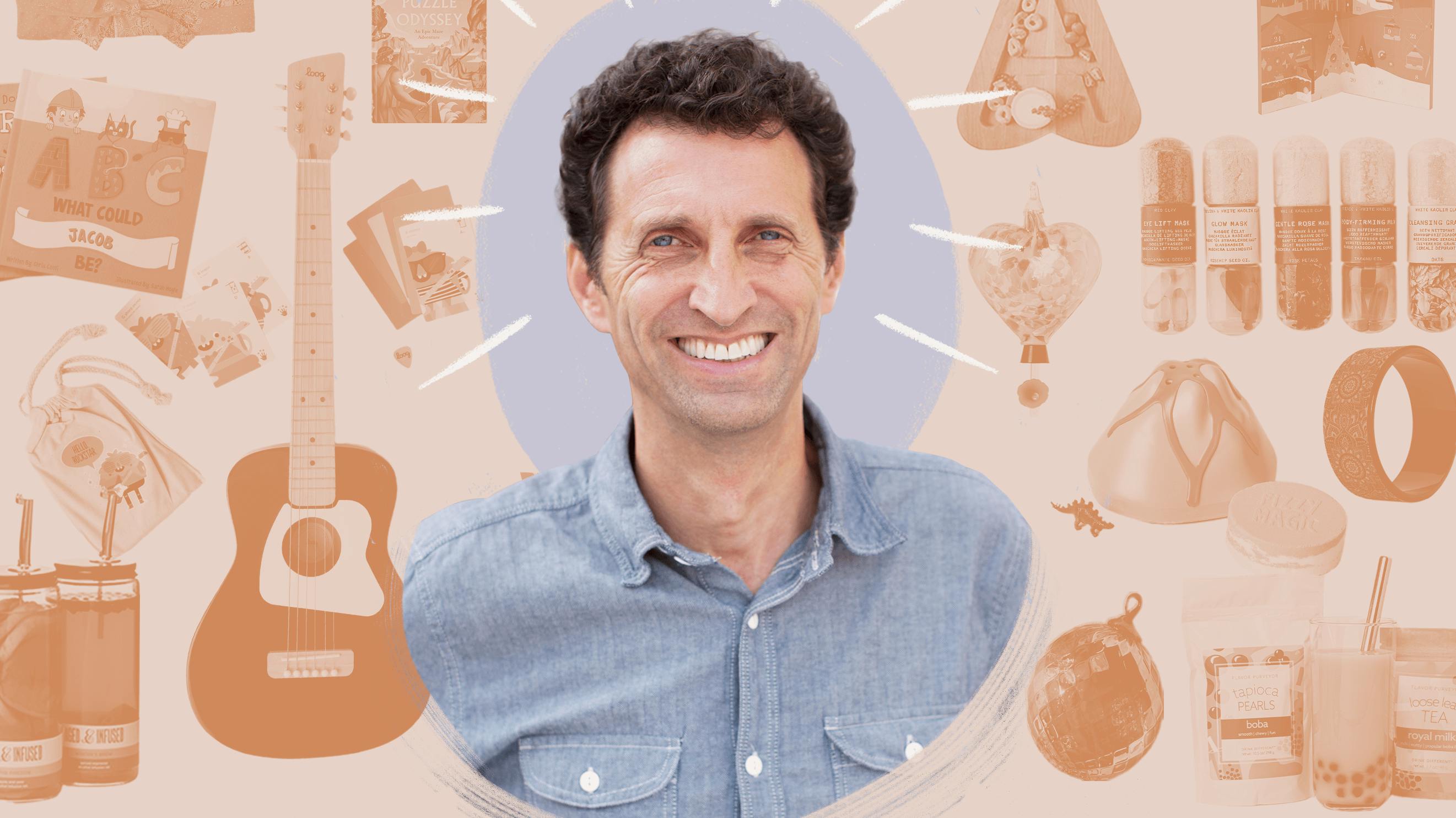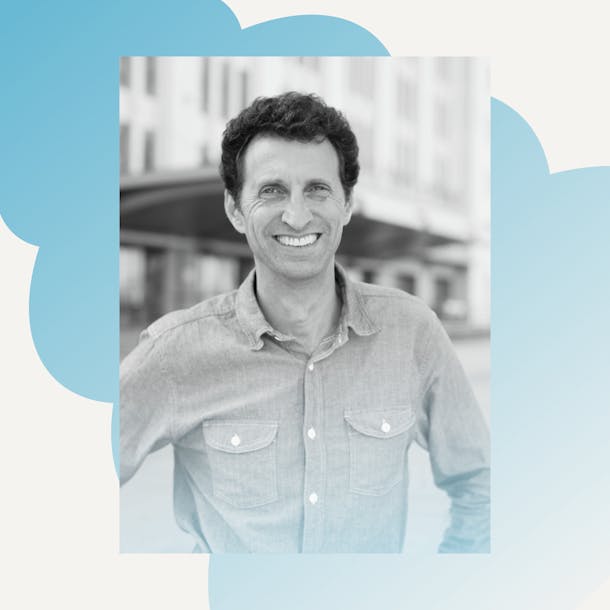
Feature Story
Uncommon Goods strives for better, not bigger
How scaling leadership skills and company values helped Dave Bolotsky guide the growth of Uncommon Goods
Dave Bolotsky, founder and CEO of Uncommon Goods, has always been happy to go his own way. “I’ve never felt like I go out of my way to be different for the sake of being different — but not being part of the crowd is a comfortable feeling for me,” he said.
Growing up on Manhattan’s Lower East Side, Dave was a self-described “skinny kid with long hair” whose love for animals led him to become a vegetarian at the age of 11. He volunteered at a local nature center when his family moved to the suburbs, loved music, and dreamed of starting his own record label one day.
He honed his entrepreneurial skills through neighborhood ventures like a baseball card business, a paper route, and a lawn mowing service. He was reflective and independent.
But this authenticity wasn’t always easy.
“I got picked on a lot,” Dave said. “My dad had taught me not to take crap from anyone — so I also got into a lot of fights. I learned to adapt, but it was an unpleasant experience for a while. I think that gave me a certain toughness and a lack of fear of going my own way, as well as an appreciation for the outsider.”
Dave’s drive to go his own way and be his own person carried through the next stages of his life, too — as he went to college, worked on Wall Street, and eventually launched his own business. Today, his affinity for the uncommon is right there in the tag line for the company he founded: “We’re all out of the ordinary.”™
Over the last 22 years, Uncommon Goods has grown to be a go-to source for shoppers seeking unique, authentic, and beautifully crafted products and experiences. The online and catalog retailer highlights creative design and independent makers, connecting them with buyers looking for that extraordinary find — be it a vertical vinyl record player with bluetooth, a handmade Tunisian tea set, or a death by chocolate truffle kit and accompanying online class.
While the long-term success of the company speaks to Dave’s entrepreneurial vision and good business strategy, the “growth” story here is one of values as much as it is revenue and headcount.
Learning what it means to live your values
When Dave describes the values and life experiences that not only prompted him to launch a company but also shaped his leadership style, he credits his parents.
“They weren’t saints, but they really lived their values, and I saw that every day,” Dave said.
His mom, a social worker and activist, advocated on behalf of low-income elderly folks and fought for the rights of other marginalized communities. “She definitely forged a strong sense of right and wrong in me, as well as a commitment to fight for the underdog,” he said.
Dave’s dad, a photographer, impressed upon him the value of authenticity, independent thought, and personal integrity. He also offered Dave an early view into the lives of independent artists.
“He often took photographs of artists’ work — and these were poor artists in our neighborhood who couldn’t afford to pay him for the photography. Instead, they paid him in art,” Dave said. “Those visits gave me an appreciation for art as well as for the struggle of making a living as an artist.”
Dave’s parents also challenged him to articulate and defend his beliefs on a regular basis. “Dinner table conversations often required me to justify my actions and explain my stance,” he said.
Those foundational values, paired with the independent streak that Dave describes as a through-line of his life, were essential when he took the leap to found Uncommon Goods in the late nineties.
Making a (well-informed) leap into online retail
Dave started his career as a retail analyst soon after college graduation, and he spent 14 years working on Wall Street before he decided to veer off the beaten path and found his own ecommerce business. It was a risky proposition at the time, in what was still the Wild West of early online retail. Amazon and Ebay had both launched in 1995 and PayPal in 1998; Etsy wouldn’t appear on the scene until 2005.
But Dave didn’t make this decision on a whim — it was backed by extensive research. As a retail analyst, he had benefited from a front-row seat to the developing story of online retail, ultimately leading him to head up the U.S. Retail Research Division at Goldman Sachs from 1994-1999.
“My job was to predict the future of the retail industry, and it was pretty clear to me that internet retailing was going to be huge,” he said. After more than a decade researching and writing on the retail sector, he was ready to shift gears. “I finally decided I’d rather be building an online business than writing about them.”
Tapping into that same entrepreneurial drive that fueled his childhood ventures, Dave seized the opportunity to build something of his own in a new, innovative space.
He began to put his expertise to work, evaluating potential product ideas that would fill a need and solve a problem in relatively uncharted territory. “There was a lot of skepticism at that point about internet retailing and what would actually sell online,” he said.
As he considered the options, he knew he didn’t want to sell just any widget. “It was really important to me to work in a product category that I could relate to, that meant something to me,” he said.
Ultimately, it was a love for art and music that inspired his first business ideas. He looked into online instrument sales and researched platforms for art and craft supplies — until someone suggested he attend the Smithsonian Craft Fair in Washington, D.C.
It was that visit to D.C. that finally presented Dave with a viable idea he could get excited about. “A light bulb went off. I saw that the goods were reasonably commercial products, but the craft show model was incredibly inefficient,” he said.
The makers had to bring their products to the show, often traveling from a great distance, had only two days to sell, and then had to ship the unsold products that remained back home. Consumers could browse and purchase on the spot, but they had no way to return merchandise or go back to shop the same maker’s goods again. At that moment, Dave said, “I thought: This is perfect for online selling.”
But not everyone agreed. According to Dave, the conventional wisdom at the time was that the business had three strikes against it from the start: First, people needed to be able to touch and feel these products; second, most people shopping online at that point were men, and these were products geared more toward women; and third, the company name was far too long.
“People told us, ‘Nobody’s going to type in Uncommon Goods,’” Dave said.
Never one to follow the crowd, Dave ignored the naysayers in favor of his own gut instinct. He launched Uncommon Goods in July 1999.
Staying authentic through growth, layoffs, and B Corp certification
Using his own savings and a small investment from friends and family, Dave grew the company to 35 employees in the first year. But when the internet bubble burst in 2000 after years of big investments and speculation around the rise of online shopping in the late nineties, Uncommon Goods was among the many retailers who were forced to downsize or completely shut down.
Dave made the difficult call to downsize to just five employees.
Letting go of people who had committed to the company and the mission was incredibly tough for Dave on a personal level. As he considered how he’d build the company back up, he made an even deeper commitment to being “better, not bigger” — ensuring values-aligned growth that would reflect the principles that had shaped his own life. He was determined to grow a company that would do good, not just do well.
From that point, Dave moved forward with a financially conservative approach, taking on no debt and only limited outside investment — and not taking a salary himself for the next six years.
This dedication to sustainable growth and making a positive impact — as the company grew back from what Dave refers to as a “near death experience” — led Uncommon Goods to become one of the first-ever certified B Corporations (B Corp) in 2007.
Being held accountable to benefit people, the planet, and the financial bottom line helped Dave and the Uncommon Goods team stay focused on values and impact as the business gained traction. “I learned a lot through certification and regular evaluations, and I was challenged to improve,” Dave said.
Specifically, while providing employees fair — and above average — compensation was a priority from the company’s launch, it wasn’t until they became a B Corp that Dave understood the full scope of what that meant.
“When I started, I wasn’t sensitive enough to the issue of a living wage and other factors,” Dave said. “Since becoming a B Corp, we’ve been learning and scaling those efforts internally — and advocating outside the company through legislative efforts. Now, our lowest paid worker makes $20 an hour.”

In the Works, in your inbox
How tough feedback led to stronger principles
Dave knew from day one that he wanted to build a business that put people first and did good in the world.
But articulating his values and reinforcing them through company structure and operations took time. “I think we’re more true to our original values today than we were in the beginning — and that may not be a boast but rather a critique of where we started,” Dave said.
While the decision to become a B Corp was a public, outward reflection of Dave’s personal vision for the company, he learned along the way that his vision and commitment needed to be communicated internally, too.
In 2014, 14 years after the brutal layoffs that inspired his intentional commitment to values-based growth, Dave sensed a disconnect in the company. Uncommon Goods had been profitable at that point since 2003 and was continuing to grow, but employee turnover was high, and he knew something was off.
“I knew what my values were, and I thought I knew what our shared values were as a company,” he said, but he wasn’t seeing that reflected in the team. To help find alignment, he brought in an organizational management consultant — and the feedback wasn’t pretty.
The consultant explained that many team members didn’t feel that Dave was living up to the values the company promoted, and, in some cases, they couldn’t even describe what those values were. “He said to me, ‘You know, Dave, they’re not mind-readers, and it’s not a 10-person company any more.’”
The feedback wasn’t easy to take — but for Dave, it spurred a lasting change. Together, the Uncommon Goods team launched a collaborative process in which they codified values. Today, the company’s 7 Guiding Principles are posted on the Uncommon Goods website and reinforced in everything the team does.
“I meet with every single person we hire — including the hundreds of seasonal team members we bring on over the holiday season — either individually or in groups, and I share our company philosophy and our values,” Dave said.
Guiding principles are also the basis for regular, public expressions of gratitude to team members, shared during weekly company meetings. “We’ve maintained open-book management throughout the history of the company, so every week we share our leadership team notes with the entire company, which includes our financial results,” Dave said. “As part of that weekly sharing, we thank people for various contributions and we tie those contributions to particular guiding principles, which helps us reinforce values and keeps us grounded.”
“A cold bucket of water” and lessons in leadership
The same look inward that prompted the team to align around guiding principles in 2014 became an unexpected gift of insight for Dave — one that would help him continue growing as a leader while the team united around values.
In interviews the consultant held with employees, they revealed that Dave was often overly critical, quick to point out mistakes and potential problems.
In the same way he had been unaware of the lack of alignment around values, the feedback about his leadership came as a surprise to Dave. “It was like a cold bucket of ice water being poured over me — and I needed that,” he said.
“I tend to have a glass-half-empty — or three-quarters-empty — mentality. When I would look at something, my instinct as a leader had been to focus on what was wrong with it. That can be demoralizing for a team,” he added.
But while the negative input could have inspired defensiveness, it had the opposite effect, pushing the founder to focus on growing his leadership capabilities in order to help the company grow. “I’ve worked really hard since that feedback to modify my tendency to react negatively and instead present things in a more appreciative, constructive way,” Dave said.
Continuing to seek feedback himself and to nurture that practice company-wide is an ongoing focus. “I've learned over the years that if somebody tells you you're perfect, they're lying to you. And, more importantly, they're not helping you get better.”
The most meaningful feedback, he said, is the kind that challenges you. “It may not always be wrapped in a bow. It may be rusty or sharp-edged, but it's the real gift. And it's up to you to accept it that way and internalize it in that manner and use it as a way to make yourself better.”
When it comes to how he measures his leadership development and ongoing efforts to “be better,” Dave can now confidently point to his team, the people he seeks to serve every day. Following the “inverted pyramid” management model, he says it’s his responsibility to support team members while they serve customers.
“I’m at the bottom, as founder and CEO; our team members are in the middle; and customers are at the top,” Dave said. “It’s my job to make sure the team has the skills, tools, and support they need to succeed.”
His intentional work has paid off, as reflected by improvements in staff retention and a widely shared set of values across the company.
“I would say the best litmus test of leadership is to ask if talented people want to work with you, given that, especially today, they have lots of other options,” Dave said. “By and large, people want to stay at Uncommon Goods. The fact that our values attract and help us retain great team members — and thereby allow us to provide jobs and support communities — is the most significant factor in how our values provide an advantage.”
A risk worth taking
Today, the tough lessons of the past are still guiding Dave’s growth and driving continuous improvement across the company. As a result, Uncommon Goods is thriving.
It turns out a risky idea in those early days of internet retailing was a good bet. “Somehow, we’ve managed not to strike out,” Dave said.
Over 200 team members — executives as well as operations and warehouse employees — work together at the Brooklyn, New York headquarters. The company is independently owned, profitable, and has grown every year since 2003, even through the Great Recession.

Uncommon Goods has been recognized as a Forbes Small Giants “Best Small Company” and as a B Corp Best for the World™ company in the community category five times. Dave has been honored for his efforts as an outspoken advocate at the state level in New York for paid family leave and for a higher federal minimum wage. The business has donated over $2.6 million since 2001 through its Better to Give program, through which $1 of every purchase is donated to one of several nonprofit organizations the business supports.
Dave’s personal values have made their way into other policies and aspects of the business, too. For instance, Uncommon Goods encourages environmentally friendly, sustainable materials for production and shipping. Dave has also made sure all products sold through the marketplace have been “leather, feather, and fur-free” since the beginning.
From Dave’s early craft-show finds, the goods — and custom crafted experiences — available to shoppers are now hand-picked by a buying team that travels the globe to find singular products you can’t buy from a big box store or online mega-retailer. The selection has grown to include products that the company designs and manufactures in-house, as well as those selected through an online submission process.
While the scope of goods and offerings has grown, Dave’s desire to support the independent makers and small businesses at the heart of the company remains unchanged.
From the beginning, he said, “The foundation of our values at Uncommon Goods has been how we treat people,” and the people whose products fill shoppers’ baskets are at the center of that commitment. “It’s a great feeling to support these artists, and we always want to treat them with dignity and respect. We want to be human beings in our relationships with them,” Dave said.
And while there’s no question that independent makers today have many more online options to connect with shoppers than when Dave founded Uncommon Goods, he’s confident in the enduring draw of a company that leads with values.
“It's very easy for artists and makers to get lost on other large platforms, and we continue to work really hard to help these folks build their own businesses and express their individuality. I think it's as important as ever to do that. I don't think that's an idea that grows old.”
Authentic success means better, not bigger
As he looks ahead, Dave remains grounded in growing for good — and always being out of the ordinary. While he knows that proclaiming purpose has become a competitive advantage for many companies, leading with values has never been about bringing in more dollars.
“I think there are companies that probably do much less than we do, but they tell a much better story about it, and that's fine,” he said. “That's not why we do it. We do good because we believe it’s the right thing to do, not because it's going to cause customers to click on something.”
When asked if he considers the positive impact he has had on people’s lives — employees, makers, and customers — through Uncommon Goods to be a marker of success, Dave said he’s still driven to do better.
“That positive impact on people is one-third of how we measure success. The second is our impact on the planet, and the third is the financial impact of the business. We’ve made good progress, but I’d say we have more work to do across the board,” he said. “Helping to create a positive place to work for our team, especially for those who may traditionally have less opportunity and might be treated less well by society, energizes me. This work and this company will matter to me as long as I live.”



